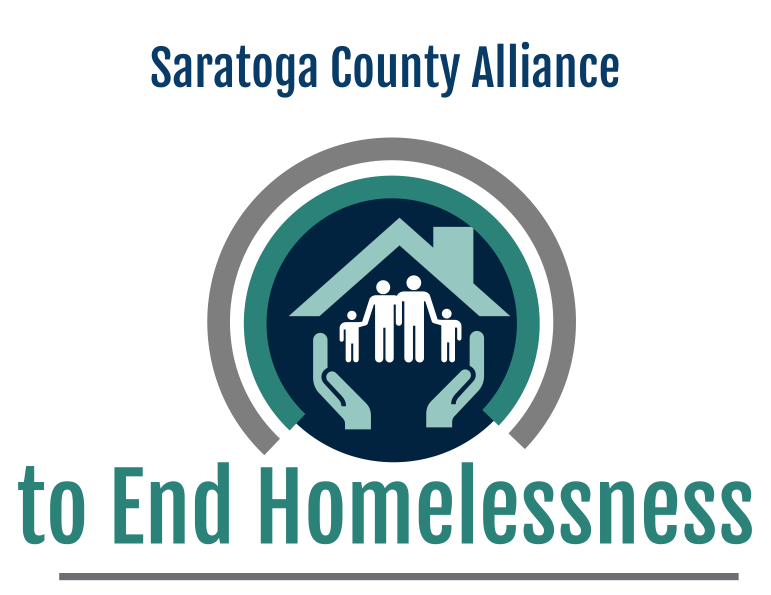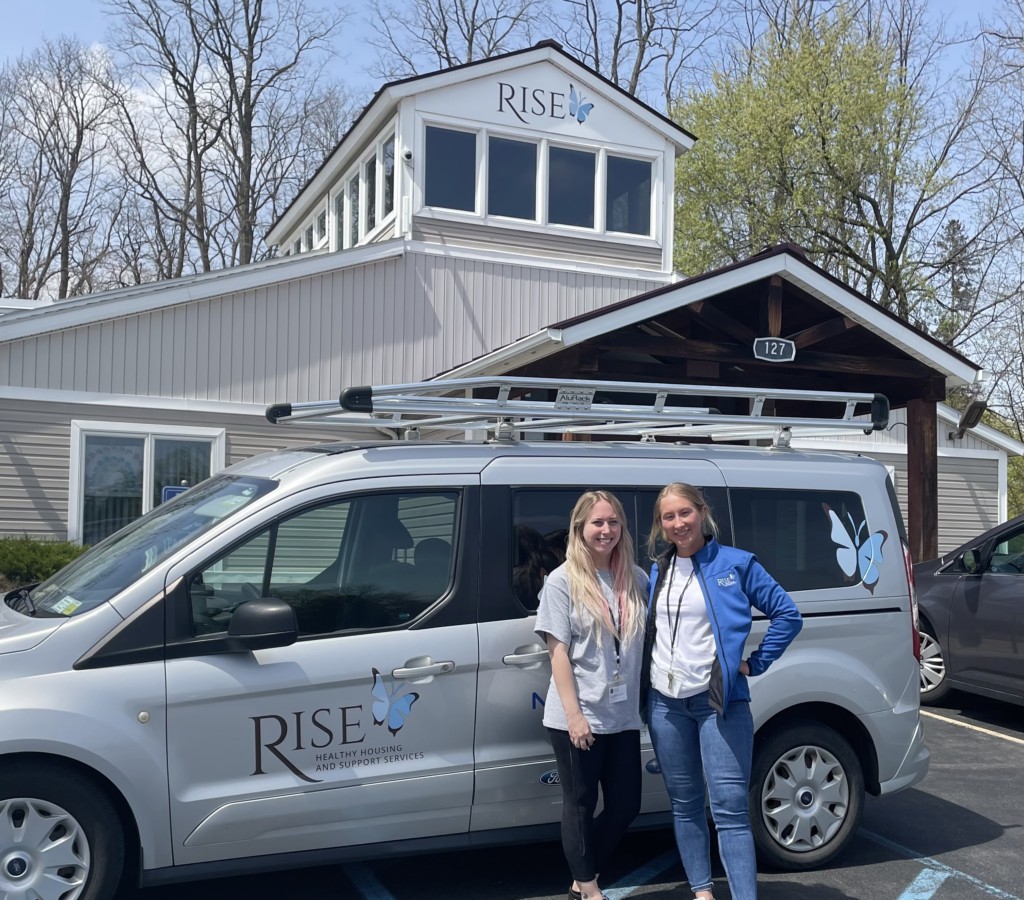
The Saratoga County Alliance to End Homelessness contributed this article that was posted in the Saratoga Today, 5 Questions on Mental Health and Street-Homelessness with the RISE Outreach Team.

In recognition of Mental Health Awareness Month, the Saratoga County Alliance to End Homelessness sat down with the street outreach team members at RISE – our county’s sole mental health and recovery housing provider. Victoria Furfaro and Jenna Espey provide outreach services to individuals experiencing street-homelessness in Saratoga Springs and coordinate the City’s Community Outreach Court – assisting persons with a mental health diagnosis or substance use disorder who are also experiencing street-homelessness, from continuing the cycle of street, to jail, and back into the courts.
Q: What is a typical day like for a Community Outreach Court Coordinator?
Victoria: We keep an extremely flexible schedule to serve frequent drop-ins and handle crisis situations as they come up. We are in the court room on the 2nd and 4th Tuesdays of every month, providing updates to the Judge, Public Defender, and Assistant District Attorney. When not in the courtroom, we are navigating service systems and networks in our community on behalf of our clients or looking for other displaced individuals to provide preventative care so that they don’t engage in illegal activity to have their needs met.
Jenna: Our work is completely client centered, so each day is different based on their needs. We meet with Outreach Court participants to evaluate their situation and determine resources they would benefit from being referred to – and facilitate those connections. We follow up weekly on the status and progress of treatment throughout the pendency and even after the client’s case is resolved. This is successful because clients can form trusting relationships with us through continued contact. The majority of those we serve do not have phones or means to keep track of appointment times, so we often go out into the community to locate our clients.
Q: Does your professional experience in Saratoga indicate a correlation between street-homelessness and mental health?
Victoria: Through my work in Saratoga, the correlation between street-homelessness (specifically) and mental health has become abundantly clear. I would say the majority, if not all, the folks we work with have a mental health condition – whether it be diagnosed and treated… or not. Maslow’s hierarchy of needs outlines the importance of having basic needs met to reach an optimal psychiatric state. When an individual is experiencing street-homelessness, they are not having those needs met, and are more vulnerable to developing or exacerbating a mental health issue.
Jenna: Yes!- Without continued treatment and services, it is hard for an individual that is living with mental illness to stay off the street. Supported housing is an effective option for people living with mental health conditions – offering a variety of services such as health care, peer support, advocacy, money management, daily living support, social/recreational activities, and crisis intervention. Unfortunately, lack of funding is often a major barrier to the implementation of supported housing programs.
Q: What resources are available for folks experiencing street-homelessness that are struggling with mental health issues?
Victoria: Individuals experiencing street-homelessness have the same mental health resources as someone who is housed – though they suffer additional roadblocks to access. They often do not have insurance, and if they do, they likely do not have their insurance card. Transportation to appointments is another inequitable barrier. Even when telehealth is provided as an option, most do not have cell phones or laptops to meet virtually. Due to the COVID pandemic, waitlists for outpatient mental health services are very long. If an individual misses an appointment, they must wait for another slot to open. Due to unreliable transportation and minimal access to clocks/watches, missed appointments are inevitable.
Jenna: The Community Health Center provides a variety of services, including behavioral health care. The Saratoga Mental Health Clinic provides emergency and crisis intervention, screening, and referrals, individual, family, and group counseling, medication education and management, and symptom management. Unfortunately, when individuals are living on the street, they cannot appropriately manage their mental health symptoms. They often become decompensated to the point where they are unable to take care of themselves – not only mentally, but physically. If a harm to themselves or others, the Saratoga County Mental Health Clinic can be contacted to request a “pickup order.” In this situation, an individual would be picked up by the police and brought to Saratoga Hospital for a mental health evaluation. If deemed necessary, they would be admitted to the Hospital’s Mental Health Unit. In a perfect world, the individual would then be transferred directly to a housing program that would provide extra support while they focus on their recovery and/or mental health needs. However, due to the growing need for low-income housing and support services, many housing programs have long waitlists which leads to individuals being released from hospitals back to street-homelessness.
Q: What resources are missing?
Victoria: The biggest gap is the accessibility of providers. Mobile units are far and few between and are CRUCIAL for these individuals. Providers’ knowledge of street-homelessness and the correlation it has with mental health and chemical dependencies could also be improved upon. Often mental health providers will deny a client if they are using substances due to being outside of the scope of practice, though the two essentially go hand-in-hand. Our community is also in need of crisis stabilization residences/hospitals for individuals in acute psychiatric distress. RISE currently operates the only 2 crisis-stabilization beds in the City and is developing a facility which will add another 10. We anticipate opening the doors before the end of 2022.
Jenna: We need more low-income housing! No human can be their best self when their basic needs aren’t being met. Providers face many barriers to finding housing for individuals living with mental health conditions. Some examples are landlords refusing to accept subsidized rent payments, stigma surrounding those with mental health conditions, and lack of available, affordable units. RISE is working to fill this gap with two 60-unit affordable housing developments in Ballston Spa and Corinth. Half of these will be supportive housing units for those living with mental health conditions.
Q: What do you think is the most important thing for our community to know about street-homelessness and the impacts of mental health?
Victoria: I think it’s very important that individuals in the community put themselves in the shoes of those experiencing street-homelessness, as they are often looked down upon. If YOU had to wonder where you would lay your head at night, where your next meal was coming from, or if you would find a restroom to use, how would your mental health be? Feelings of self-worth, purpose, and acceptance often elude these individuals, and the community can play a role in advocating for those who have lost their voice.
Jenna: Society needs to understand that with housing and support from service providers, individuals living with mental conditions can manage symptoms and live productively in communities. Too many believe homelessness is due to individuals’ shortcomings, while studies show that the four main causes are lack of affordable housing, poverty, unemployment, and low wages. Due to this, there are many gaps in services that make it difficult for individuals that are experiencing street-homelessness and impacted by mental health issues to get back on their feet. Efforts need to be made to mend these gaps in the system to effectively help our street-homeless population.
Learn more at The Saratoga County Alliance to End Homelessness Website.
RISE is proud to be a participating agency in the Saratoga County Alliance to End Homelessness.
